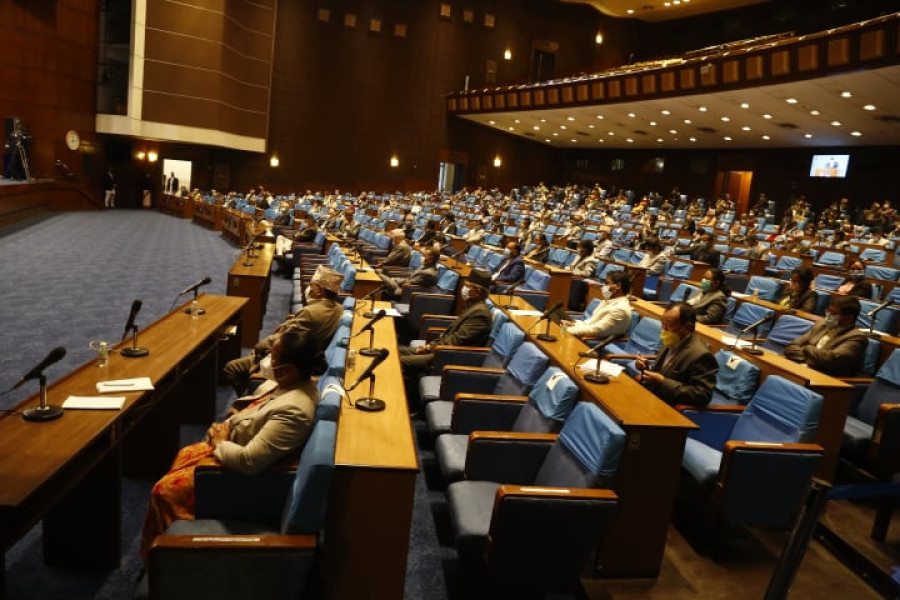Politics
Government presented repealed ordinances in Parliament, creating legal confusion
While experts say there was no need to take the ordinances that were null and void, Law Ministry argues no provision bars from doing that.
Binod Ghimire
Prime Minister KP Sharma Oli’s move to introduce two ordinances and repeal them after five days last month had run into controversy, while dragging the Office of the President along. It now has created a constitutional debate after they were presented in Parliament.
On Friday, Minister for Law, Justice and Parliamentary Affairs Shiva Maya Tumbahamphe presented an ordinance that revived the original provisions in the Political Party Act and Constitutional Council Act. But along with that, she also presented the two ordinances, which were repealed by the President on April 25.
Constitutional experts say the government unnecessarily presented the two ordinances in Parliament as they had already been repealed by the President as per the recommendation of the Council of Ministers.
“This is an immature move by the government. It seems the Law Ministry did not have proper legal consultations,” Chandra Kant Gyawali, an expert on constitutional affairs, told the Post.
Article 114 of the constitution has provisions regarding ordinances.
Article 114 (2) (a) says an ordinance shall be tabled at the session of both Houses of the federal Parliament held after the promulgation, and if not passed by both Houses, it shall ipso facto cease to be effective. And Article 114 (2) (b) says it may be repealed at any time by the President. According to Article 114 (2) (c), unless rendered ineffective or repealed under sub-clause (a) or (b), it, ipso facto, ceases to be effective at the expiration of 60 days after the day on which a meeting of both Houses is held.
When the President repeals ordinances as per Article 114 (2) (b), a new ordinance is issued to notify that the original laws, which the ordinances had sought to change, had been revived.
Experts say the government, hence, should have presented only the last ordinance that revived the original laws so as to bring to lawmakers’ notice that no change had been made in the provisions of the Political Party Act and Constitutional Council Act.
“There was no need for the government to present the ordinances, which were not in force, in Parliament,” said Gyawali. “The government, however, could have just brought the event to Parliament’s notice.”
A spokesperson for the Law Ministry, however, defended the government move of presenting the ordinances.
“There is no provision that says ordinances repealed by the President should not be presented in Parliament,” Dhan Raj Gyanwali, the ministry spokesperson, told the Pots.
Law Minister Tumbahamphe echoed him. She, however, said the repealed ordinances do not need to be discussed and tabled for endorsement.
“The only ordinance that needs discussion and endorsement is the one which revived the original laws,” Tumbahamphe told the Post. “Once the House endorses it, we will present a replacement bill.”
However, the replacement bill is also a confusing issue in this particular case, according to experts.
As per parliamentary practices, a replacement bill is introduced in the House after an ordinance is endorsed within 60 days of the first meeting of the House. The replacement bill, once endorsed, becomes a law, which means it prevails over the earlier law.
As far as the ordinances on the Political Party Act and Constitutional Council Act were concerned, they were null and void within five days. No actions were taken as per the changed provisions during those five days.
The ordinance on Political Party Act sought to ease the provision of a party split and registration of a new party, as it said either 40 percent of Central Committee members or Parliament Party members can split up a party.
The Samjbadi Party Nepal, which was on the verge of a split as per the new provision, rather united with the Rastriya Janata Party Nepal. For unification of parties, there is no legal hurdle from the Political Party Act.
The ordinance on Constitutional Council Act sought to change the process of appointing office bearers in the constitutional commissions. A change in the provision meant the Council could make appointments even in the absence of the leader of the opposition party. No appointments, however, were made during those five days when the ordinance was in effect.
Gyawali, the expert on constitutional matters, said the government needs to present only those ordinances which are in force when the new session of the House begins.
“The House then has to endorse them within 60 days,” he told the Post. “But on Friday, when the first day of the budget session started, both the ordinances related to the Political Party Act and Constitutional Council Act were already null and void.”
A Law Ministry official admitted that there is divided opinion on the issue.
“There is a confusion because this is the first time such a situation has arisen,” the official told the Post on condition of anonymity because he was not allowed to talk to the media. “This move will be—or rather it should be—challenged in the Supreme Court, which is the ultimate interpreter of the constitution. A court decision on the issue could provide clarity for the future.”




 13.12°C Kathmandu
13.12°C Kathmandu















